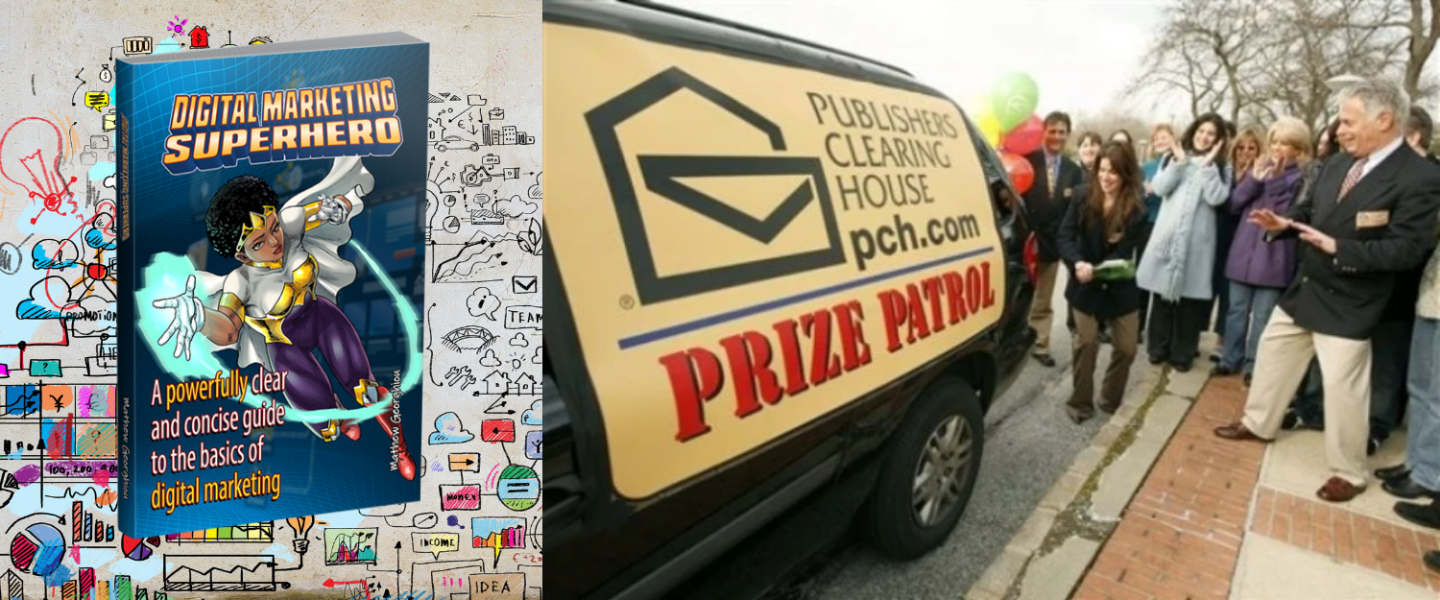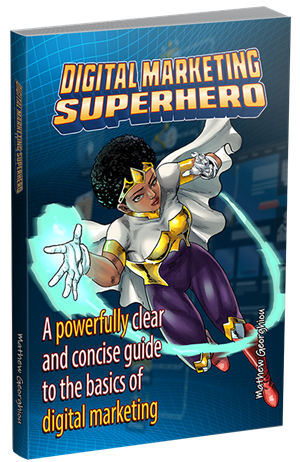
I Followed The Marketing Gurus and Here's What I Learned and Did
This is my story about digital marketing ...
I've spent hundreds of hours over the past two years specifically studying modern digital marketing.
I followed several "gurus" who have many followers, purchased some of their programs (thousands of $), and watched hours and hours of their video pitches trying to sell me more.
I've attended the webinars where people spend thousands of dollars on pitches that suggest you can get rich fast on the Internet, or be your own boss with just a computer, have a comfortable lifestyle as a solopreneur, or sell millions of something with just one marketing funnel or app.
Even when I had no intention of buying anything (which was 99.99% of the time), I still followed and watched. Sometimes these were marathon sessions of 2 to 3 hours of pitching.
I even followed many of the shady people who pretend to own fancy cars, houses, and yachts.
My inbox is full of real and spammy pitches.
And I read them.
All for my research.
Yes, I was the kid in the 1980s who read all the junk mail that came home, including applying all the stickers on the Publishers Clearinghouse contests. Good thing for you that weird nerds like me are willing to put the work into this stuff. 🤓

I also do digital marketing for my various businesses. I've been doing that since digital marketing first emerged in the 1990s.
But doing is often very narrow.
Research beyond doing is needed to get a more complete picture.
Particularly as digital marketing has expanded so much.
So that's why I have been on this mission for the past 2 years.
What did I discover from all this?
You are probably wondering if it's all a sham or a scam.
Most of the time, the answer is not so black and white.
Yes, much of the advice has *some*value.
Some of the training even has a*lot of value*.
Yes, there are *some*people that actually succeed.
Yes, you *could*too.
But, the odds are against you.
Most people will fail at this.
Why?
Because marketing with the objective of getting people to take some action is not easy— it's hard.
It might come easy for a tiny few people who are at the right place at the right time with the right offer.
But the vast majority will find it unbearably hard.
And they won't have luck and timing on their side.
And they will give up or fail.
To clarify, the*marketing concepts*are not necessarily hard to understand.
Most people can learn how to put together a landing page, video, or other content. And much of the training they buy in these programs shows how to do this.
Certainly, there are some activities that are quite complex — if you've ever used Facebook or YouTube Ad Managers, you know what I mean.
But, overall, progress is achievable by most people who have the time and motivation and are willing and able to recruit help when needed.
But progress is not enough.
All of these marketing programs are pitching a new career or lifestyle or source of income. To achieve that, you need to market and sell.
So ... what is hard,*really hard,*is achieving results — profitable results.
That's a monumental achievement.
Few ever get there.
Most fail at it somewhere along the way.
What are profitable results?
This means generating a positive return on investment(ROI).
Getting more out than you put in. That's the fundamental formula for any successful business or investment.
Yes, if you build a product or service and buy advertising you will win customers, eventually.
But at what cost? If you spend $1,000 to win $700 in customer revenue, you are not winning, you are losing.
If you spend 100 hours creating and posting content on social media to build your brand and you win $700 in customer revenue, you are not winning, you are losing.
But perhaps these investments will result in more sales in the future.
Perhaps you will gain enough momentum for your return on investment to switch from negative to positive.
It's possible.
In fact, that's how most businesses work — lose money until you make money.
But will this work for you ?
How long will it take for you to switch from losing money to making money?
Can *you*hold on long enough for that to happen?
Will it ever happen for you?
What else could you*have invested your time and money doing that might have been better? (This is called *opportunity cost.)
These are the questions I do not see addressed when marketers are selling the dream lifestyle.
This is not easy, it's hard.
Does the possibility of failure mean you shouldn't even try?
That's for you to decide, not for me to recommend.
In fact, as an entrepreneur myself, I regularly accept these risks and the failure that comes with them. That's the choice I make for myself.
After all, you can't score if you don't shoot.
And all education has value, even when failing.
— I wrote about Failure, Gaming, and School here
Just be aware that the odds are against you.
Regardless of how many testimonials of success the pitch throws at you.
A high degree of failure is inherent in any business endeavor.
But, wait, there's more!
I'll share something else I discovered by observing other people who have bought into these programs.
Many seem to be struggling to overcome some type of psychological barrier.
Now, I'm not a psychiatrist, but I do play one on the Internet occasionally🤓
The struggle is often described as a "limiting belief" or "imposter syndrome" or some other invisible barrier that stops one from striving for more in life.
People are buying into a program with a step-by-step recipe that they think will help them overcome their own personal barriers.
They are not buying information, they are buying transformation.
Or perhaps more accurately, the promise of transformation.
But the recipe on its own is not enough for many. Because what they seem to need more of is another human being to cheer them on and lift them up. To tell them that they can do it. And sometimes to hold their hand while they do.
Nowadays that's called a coach.
And I think this is why we've seen such rapid growth in the coaching industry.
There are coaches selling their services in every niche you can imagine.
There are coaches selling programs to other coaches.
There are coaches selling programs to other coaches to sell to other aspiring coaches.
Presumably because so many of us humans need other humans to guide us and cheer us on.
Is having a coach helpful?
It can be under the right circumstances.
Coaches can provide guidance, confidence, training, and accountability — all valuable services to help you achieve your goals.
But so many coaches don't seem to have the life or career experience needed to properly play that role (and accept money for it). They bought a training program to become a coach.
Is that bad — does that mean they cannot be a good coach?
Not necessarily. You do you. I'm just sharing my observations here.
So, what am I doing with all this newfound knowledge?
Besides sharing it here, partway through the research process, I decided to develop a new training program of my own. And write a book.
No, you will not see pictures of me in fancy cars, homes, and yachts pretending that this could be you too.
My training program is not designed to help you get rich quickly. It might help you get rich slowly. Or not rich at all. Unless you consider gaining new knowledge and skills rich, then it will do that for sure.
My training program is not going to give you a step-by-step recipe for how to start an Internet business. Or how to become a coach. Or how to game Facebook advertising.
Nope.
Instead, I noticed there was a knowledge gap in helping people understand how all the elements of digital marketing integrate together to create a cohesive strategy.
People are spending time and money on training that is very narrow in scope. And they end up getting lost in the weeds of digital marketing and don't know where to start — even when they have a recipe in hand.
Because understanding both the basics and the big picture of marketing is not easy to learn or teach. And that's why there are so few resources available to help with this.
This discovery triggered me to create a new training product. That wasn't my goal when I started this journey, but it's where I am today.
So, I worked with my team to develop a solution using gamified learning — our area of expertise. We invested thousands of hours in this project.
The result is our new Digital Marketing Simulation. A simulation and video-based training experience for learning the fundamentals of digital marketing and how all the elements fit together to build a cohesive funnel strategy.
The program is for personal learning and for use in schools.
We also created this Digital Marketing Glossary with 179 terms — it's free if you want it here.
And I wrote a book — Digital Marketing Superhero— for people who prefer reading rather than playing. The book uses a gamified learning approach where it puts you in the role of an inventor of a new product who must build out your marketing funnel to sell it.

The book and the simulation are not free but they are affordable — you can find them at https://goventure.net/dm and on Udemy.com
If you like more behind-the-scenes stories, I documented how we designed the simulation program in a previous issue of my newsletter here
What Next?
I'm continuing my research, although I've slowed down quite a bit since I feel as though everything I'm seeing now is just a repeat of the same pitch formula I've seen many times over.
Yes, there is a pitch formula that all the gurus use. The slide deck is full of social proof testimonials with before and after stories.
And a checklist of how much value you are going to get — it usually adds up to tens of thousands of dollars — but you're getting a big discount for a limited time only.
Sometimes there are countdown clocks when the discount expires. This is called "creating scarcity" to motivate buyers to buy — although it's often fake scarcity.
Anyway, I'm digressing and this article has gone far too long.
If you made it all the way to the bottom here, give me a thumbs up in the comments so that I can feel as though at least one person found it interesting enough to stick with it — 👍
Receive this newsletter by email —
I'm Mathew Georghiou and I write about how games are transforming education and learning. I also share my experience as an entrepreneur inventing products and designing educational resources used by millions around the world. More about me at Georghiou.com